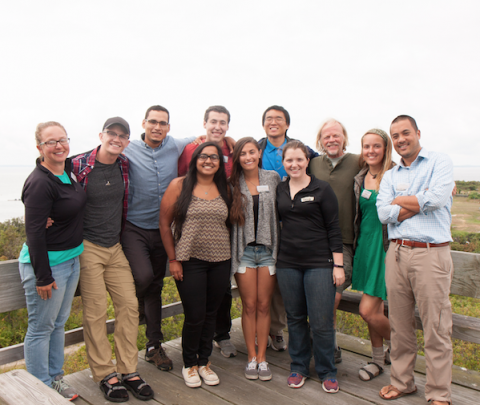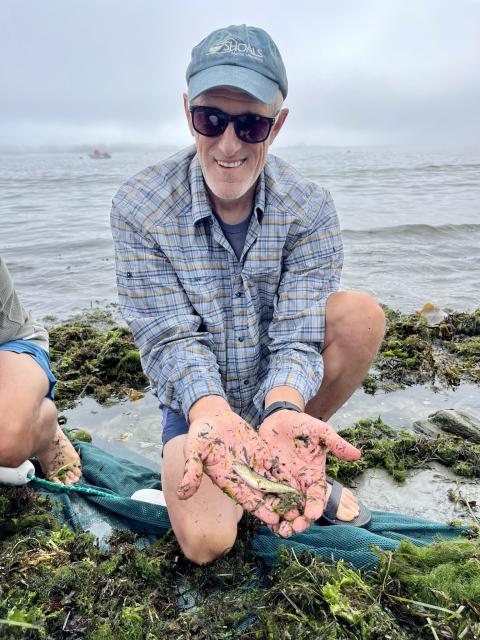The Scientist in Residence program will not be accepting applicants for the summer 2025 season.

2017 Research Interns and SIRFS
Shoals Scientist-in-Residence Fellowships (SIRF) support early career, postdoctoral scientists, and late-stage Ph.D. candidates for up to three-month residencies at Shoals Marine Laboratory (SML) on Appledore Island, Maine. This program provides financial support for residential research time that can be used for data analysis, manuscript preparation, experimentation, and collaboration, among others. Priority will be given to Fellows engaged in SML-based science. Financial support includes: travel allowance, room and board, an honorarium, and research allowance. Fellows will be given lab/office space. In addition to research, SIRF fellows are expected to assist with mentoring SML's Undergraduate Research Internship Program. The program also seeks to increase the number of scientists from underrepresented groups; however, all qualified scientists are encouraged to apply.
SML is a seasonal field station operated jointly by Cornell University and the University of New Hampshire. The island campus is located 6 miles offshore in the Isles of Shoals in the Gulf of Maine. SML is the largest marine lab in the U.S. dedicated to undergraduate education and research. SML offers undergraduate students a unique opportunity to study marine science in the field with exceptional faculty from institutions throughout North America. Instruction at SML is based on giving participants a truly "hands-on" educational experience. SML courses and internships provide rigorous training in many marine subjects and prepare students for careers in the fields of marine biology, and environmental science and sustainability. SML's ethos of responsible natural resource use and management, valuing scientific and community collaboration, and public service guides all SML programs.
Details
- Priority given to 1 postdoc & 1 assistant professor each summer who will conduct field work at SML or use SML data sets (to learn more about available data, please see SML’s website and communicate directly with the contact listed below).
- Operating season at SML: May 1 - September 1. Minimum commitment for 2024 Fellows: June 2 – August 11 (tentative dates).
- $500 travel allowance to support travel to/from SML for the start & end of the program.
- Stipend: $3,000/month
- Benefits include room & board at SML and use of SML facilities.
- Up to $1,200 research allowance at SML (to pay for research vessel use, research assistance, or supplies that SML will provide or procure for scientists). Durable goods will become the property of SML. These funds are aimed to support active, on-island research while participating in this program.
Requirements and Opportunities
- Applications are invited for any field-based natural science investigation in the Isles of Shoals. Marine topics are preferred.
- Fellows will be based on Appledore Island and expected to reside at SML as their primary residence for a minimum of 4 days/week.
- Applicants must be legally able to work in the U.S.
- Research plans must be approved by SML and they must adhere to SML research policies.
- Fellows are asked to give at least one seminar talk to the island community during their fellowship.
- Fellows are expected to spend 15-20 hrs/week mentoring 8-12 undergraduate students in SML’s Research Internship Program. Fellows will serve as the secondary mentors, complimenting the guidance of each student's primary research mentor (aka the Principle Investigators). Fellows will attend weekly internship meetings where they may be called on to provide a lecture or expertise on field research methodology or some other aspect of independent research training. Lecture time will count towards the 10 hr/week commitment. Opportunities exist for fellows to have undergraduates work directly on their own research projects (advanced planning is required and is subject to the availability of funding).
- Opportunities exist for public outreach and additional income via Overnight Programs in August and September.
- Fellows will be subject to a pre-employment background check and will be required to complete the University of New Hampshire's Protection of Minors training.
To Apply
A complete application will be a single PDF file containing, in the order shown:
- Cover letter describing your interest and availability, including current employment status and eligibility. If you are a postdoc, please include the name and contact information of your supervisor. Please highlight teaching and/or mentoring experience as well as research accomplishments.
- Curriculum vitae, including 3 professional references.
- A 1-2 page proposal describing your intended research at SML. Please provide sufficient information regarding facilities needed for your work.
Novel media or formats other than PDF deemed essential to an individual’s application may be submitted.
Only complete applications will be considered.
Deadline for applications TBD
Questions? Contact us at shoals.lab@unh.edu
Scientist-in-Residence Profiles

SIRF 2024: Dr. Mike Sigler
Dr. Mike Sigler has over 30 years of research experience in Alaska in the areas of marine ecology and fisheries stock assessment. He led the NOAA Alaska Fisheries Science Center, Habitat and Ecological Process Research (HEPR) Program, which included integrated ecosystem research programs in the Bering and Chukchi seas and ocean acidification research. Mike also has led Steller sea lion prey and predation studies, the Alaska sablefish stock assessment, and the Alaska sablefish longline survey. Mike strongly believes in the practical value of ecosystem research and its application to management of fisheries and conservation of seabirds and marine mammals. Since retiring in August 2017, his current focus is conveying that experience to students through teaching and mentoring.

SIRF 2024: Dr. Rebecca Atkins
Dr. Rebecca Atkins recently completed her Knauss Marine Policy Fellowship working with NOAA's Senior Advisor for Coastal Inundation and Resilience. She obtained her PhD at the University of Georgia's Odum School of Ecology, advised by Dr. Craig Osenberg, and graduated from the University of Florida in 2014 with a BSc in Wildlife Ecology and Conservation and a minor in Fisheries and Aquatic Sciences.
Over the past 12 years, Dr. Atkins has conducted research along the Atlantic coast, particularly focusing on salt marshes, rocky shores, and bay estuaries. While building her research program, she has also worked to promote public awareness of the coastal environment and to cultivate an inclusive scientific community.
As an early career professional, Dr. Atkins hopes to continue developing a suite of skills that will allow her to approach increasingly complex and interrelated questions using a range of analytical and interdisciplinary techniques. The experiences and the skills gained throughout her scientific career have culminated in her desire to better understand the ways in which scientific research can guide policy decisions made at local, state, and federal levels, particularly with regard to coastal resilience.
Past SIRFs
- Dr. Carrie Keogh, SIRF 2019
- Dr. Lauren Pandori, SIRF 2019
- Dr. Gemma Clucas, SIRF 2018
- Dr. Louise Roberts, SIRF 2018
- Dr. Kylla Benes, SIRF 2017
- Dr. Brian Cheng, SIRF 2017
